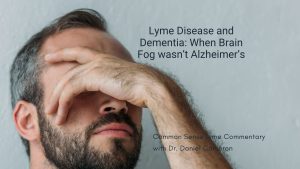Call for your appointment today 914-666-4665 | Mt. Kisco, New York

The study, by Roaldsnes and colleagues, describes 110 patients with muscular and joint pain, fatigue, memory and concentration impairments, who were assessed for possible Lyme neuroborreliosis.
These patients had non-specific neurological symptoms. “Only one patient was diagnosed with possible Lyme neuroborreliosis. Altogether 27% had high levels of Borrelia-IgG serum antibodies,” the authors write.
Many of the patients, Bjark points out, had their symptoms for more than one year. “It is difficult to read the article in any other way than this: that if a patient has had these symptoms for such a prolonged period, Lyme borreliosis is not a relevant diagnosis.”
Bjark explains that many of his patients were initially told they did not have any form of Lyme disease. “After contact with a number of patients I can state that not infrequently, patients with suspected Lyme borreliosis with no pathological findings in cerebrospinal fluid are told that they do not have Lyme neuroborreliosis, nor any other form of Lyme borreliosis that can be treated with antibiotics.”
[bctt tweet=”Are Lyme borreliosis patients failing to get diagnosed and treated?” username=”DrDanielCameron”]
Meanwhile, another editorial minimizes the plight of these patients, Bjark states. “The same message is repeated in an editorial [3] which concludes that patients who do not fulfill the diagnostic requirements for active Lyme neuroborreliosis, irrespective of an antibody level or anamnesis, should not be ‘incorrectly treated with antibiotics.’”
Some neurologists deny the existence of “musculoskeletal borreliosis,” writes Bjark. But, “A prolonged disease picture that includes fatigue, myalgia, and elevated Borrelia-IgG serum antibody levels does not constitute a non-disease.”
Patients should be treated, Bjark argues. “If they are left untreated, it is impossible to know whether these are patients who would profit from standard, targeted antibiotic therapy.”
Bjark, who has had patients improve with treatment, believes it “is most likely associated with normalization of cytokines and elimination of Borrelia-specific immune complexes over time.”
“Based on my long experience with a large number of Lyme borreliosis cases, I believe that each patient must be assessed individually,” Bjark writes. “By failing to do this, we do many patients an injustice.”
Related Articles:
Long term problems for some Lyme neuroborreliosis patients
At least 50% of patients with Lyme neuroborreliosis remain ill years after treatment
References:
- Bjark P. Patients with Lyme borreliosis are failing to receive treatment. Tidsskr Nor Laegeforen. 2019;139(4).
- Roaldsnes E, Eikeland R, Berild D. Lyme neuroborreliosis in cases of non-specific neurological symptoms. Tidsskr Nor Laegeforen. 2017;137(2):101-104.
- Mygland A. Could it be Lyme neuroborreliosis? Tidsskr Nor Laegeforen. 2017;137(2):86.



